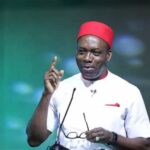Exactly how does one describe a moment such as this in the life of a nation?
A moment when that nation is exhibiting all the traits of collapse but there is no credible rebuttal by the evidence or the authorities.
A moment that, it seems obvious, there is nowhere to run, nowhere to go, nobody to complain to, and nothing else to say.
Think about it: despite all the long talk of certain ministers of government about road development in Nigeria, there are today no roads to travel from any major town or city to another one, and back.
You can travel by rail, but there is really no guarantee that you will get to your destination.
You can travel by air, but it is increasingly unclear that, should you get to your destination, that the airport will still be in the hands of the government.
Powerful voices in the federal government say that people should go into agriculture, but none of them can guarantee that, should you start a farm, the farmer and the farm will still be there by the harvest season.
You can send your child to school, but there is no evidence that the school will be there when he gets there, or the homestead still standing when he returns home.
In Nigeria today, there are only two elements that can work unhindered: the government’s propaganda machinery and the terrorists.
First, the terrorists. These non-state actors have made themselves clear: they are here to play, and nobody can stop them.
Increasingly, they have proved to be right. There is no better evidence than the fact that they have split up even the First Family: First Lady Aisha Buhari lives in Dubai, away from her husband, President Muhammadu Buhari; from her cherished Office of the First Lady; and supposedly from her children.
But at least she is “safe”. Consider that in the case of the infamous terrorist attack on the evening Abuja-Kaduna train two weeks ago, which carried 398 passengers, the lucky ones now appear to be only the dead. There were eight of those, according to the Nigeria Railway Corporation (NRC), and 26 injured.
Beyond those numbers, 184 persons are “unaccounted for,” the corporation said last week. That is an astounding 184 Nigerians whose only crime was that they boarded a train to travel between two of the biggest cities in their country.
Think about it: 184 citizens: mothers, fathers, grandfathers, grandmothers, children, workers, doctors, nurses, teachers.
The railway chief described them as “unaccounted for”, but the government has not acknowledged them. President Buhari said nothing. Government megaphone Lai Mohammed, the minister who was describing the country on the same day of the train attack as becoming “safer every day”, said nothing. Rotimi Amaechi, the Minister of Transportation, has been far too busy running for president.
Second, then: governance. 184 Nigerian citizens missing following a train attack by terrorists in a country where the president has no problems giving the presidential jet to his daughter for a photography trip, and the government stays quiet.
That is the definition of governmental complicity, at best. Or collapse.
Nigerians enter 2022 with the most ubiquitous word being “attack”. It is both the verb which describes the onslaught of a variety of non-state criminals against citizens everywhere they live or work or play, as well as the noun which denotes how the state itself relates to Nigerians in a despicable pretense of relevance or efficacy.
In the hands of Buhari and his ruling APC, as I have often said, Nigeria is a crime in progress. The relentless and pervasive violence of the terrorists and herdsmen runs in parallel with ritual killings and kidnappings, armed robbery, lynching, and sundry attacks on individuals and infrastructure.
In turn, there is the active onslaught on citizens by state institutions that is at once violent or worse, sometimes intimidation and at other times, unfathomable daylight robbery, such as when policemen use POS machines to extort citizens.
And then there is the shameless onslaught of the government itself, which, failing to dedicate itself to governance, deliberately deploys its official machinery to manipulate information and blackmail the citizenry.
That blackmail, which is often subtle and non-specific, may sometimes also be sudden, direct, personal, and brutal. There is no better example than last week when Nuru Khalid, the Chief Imam of the Apo Legislative Quarters Mosque in Abuja, was fired.
His crime? He had commented on Nigeria’s crippling insecurity, which he called the result of “collective failure” in the country, especially by President Buhari.
“Is there nobody to take responsibility?” he asked in his sermon on April 1. “I want to believe that we have all failed…I failed as an imam to teach you that life is sacred; you all failed as parents to teach your children that killing is bad. Our community leaders failed, our politicians failed, governors failed, especially his excellency, the president of the Federal Republic of Nigeria, you have failed us.”
Recalling Buhari’s electoral promises in 2014, Imam Khalid said, correctly, “We have your video telling Nigerians that the military is capable, it has all the requirements to tackle all the insurgency and if you are voted into power, you are going to make sure that happens in a short time”.
Affirming that he was willing to accept whatever consequences came from calling Buhari out, the Imam said of Buhari’s re-election: “You have been given four years and an addition, yet people are dying like fowls, killing is becoming the norm in Nigeria under your watch, Mr President.”
Imam Khalid spoke the truth. Nigeria is a crime scene with hourly tales of mass murder and kidnapping or executions and death. It is Buhari’s responsibility and his crime scene.
But the Nigeria leader does not like to hear it. He had Imam Khalid fired, making him a prominent victim of the Buhari era of which he spoke.
Ironically, Buhari only confirmed the point that his critic had made: that under Buhari, Nigeria is a failed state, and that it is unworkable.
Sadly, Buhari confirms that under him and by him, Nigeria has reached the end of the road. I do not endorse violence and would not condone it, but despite Buhari pretending that we are on course, and that there is a Nigeria which will have general elections next year, it is difficult to see that road, or that this will end peacefully.
Despite all the liars-in-chief of this administration, and of the braggadocio and pretense, we seem to be witnessing only a long, painful train-wreck.
Since March 1983 as a young man, I have been afforded the opportunity to stand at this intersection and say what I like. At first, I observed, “These Times.” I then, wrote, “As I Was Saying”.
Today, I write SOS. And this is an SOS, because at this point, Nigeria, there must be somewhere to run, somewhere to go, or someone to complain to.
Is there something else to say, dear Nigerian? If there is something you can do for Nigeria beyond seeking your own slice, the time is NOW.
This column welcomes rebuttals from interested government officials.
• @Sonala.Olumhense

 Join Daily Trust WhatsApp Community For Quick Access To News and Happenings Around You.
Join Daily Trust WhatsApp Community For Quick Access To News and Happenings Around You.



